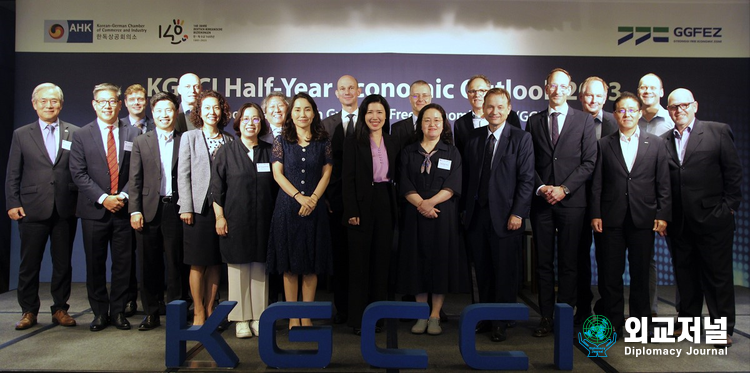By Lee Kap-soo
The Korean-German Chamber of Commerce and Industry (KGCCI, President & CEO Martin Henkelmann), in cooperation with the Gyeonggi Free Economic Zone Authority (GGFEZ), held the KGCCI Half-Year Economic Outlook 2023 on August 30 at Four Seasons Hotel.
The event, organized to provide exclusive insights into the developments of Korean-German business relations in these challenging times, drew the participation of more than 80 key officials and experts from Korean and German companies and institutions. Speakers included German Ambassador-designate to Korea Georg Schmidt, Dr. Young Kyung Suh, Member of the Bank of Korea’s Monetary Policy Committee, Juliana Lee, Asia Chief Economist at Deutsche Bank, and Frank Robaschik, Director and Correspondent Japan at Germany Trade & Invest (GTAI).

Holger Gerrmann, Chairperson of KGCCI and CEO of Porsche Korea, opened the event by saying, “We all are very much interested in a growing Korean industry closely working together on this common goal with our German businesses and the KGCCI and looking beyond our local operations to further strengthen Korea’s role as a business hub for German companies in Asia Pacific.”
Ambassador-designate Schmidt, who spoke about economic perspectives in German-Korean bilateral relations, said, “Korea is a fascinating and dynamic country and has much in common with Germany like the rapid economic growth after the War and two highly innovative economies. However, we have to rethink how we balance this growth with the social requirements of demographic change and the challenges of sustainability and climate change.”
He added, “I want to promote cooperation between Koreans and Germans in all walks of life. This year we are celebrating 140 years of diplomatic relations. This is a very solid foundation to build on for the future.”
Dr. Young Kyung Suh, Member of the BOK’s Monetary Policy Committee, spoke about ‘Domestic and International Economic Outlook and Risk Factors’ and explained, “Looking ahead, our economy is expected to gradually converge growth and inflation to a balanced level, driven by export recovery and alleviation of cost pressures.”
She also underlined the intricacies involved, stating, “However, uncertainties in both domestic and international economic conditions remain high due to factors such as China's growth slowdown, prolonged tightening stance in the United States, and the increase in household debt.”
Juliana Lee, Asia Chief Economist at Deutsche Bank, presented on ‘Global economic outlook’, noting, “While advanced Asian economies have a relatively high growth beta to China, they are even more sensitive to US growth, which has remained more resilient than expected thus far.”
Meanwhile, Frank Robaschik, Director and Correspondent Japan of GTAI, who presented on ‘Economic Outlook for Korea’, said “Overall GDP growth in South Korea will be lower in 2023. However, there are growing industries like shipbuilding and the whole value chain of electric mobility with, among others, electric cars, batteries, and battery chemicals.”
Lastly, Joo-seuk Maing, CEO of PRETTL SWH Korea & Vietnam and Taiyoen (Dan) Choi, General Manager of
Armacell Korea discussed perspectives of their respective industry sectors and the increasing importance of the Korean business for global companies during a panel discussion moderated by Dr. Martin Henkelmann, President & CEO of KGCCI.







